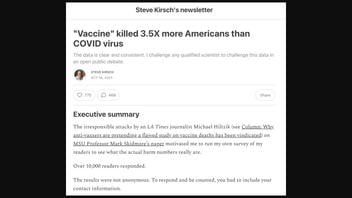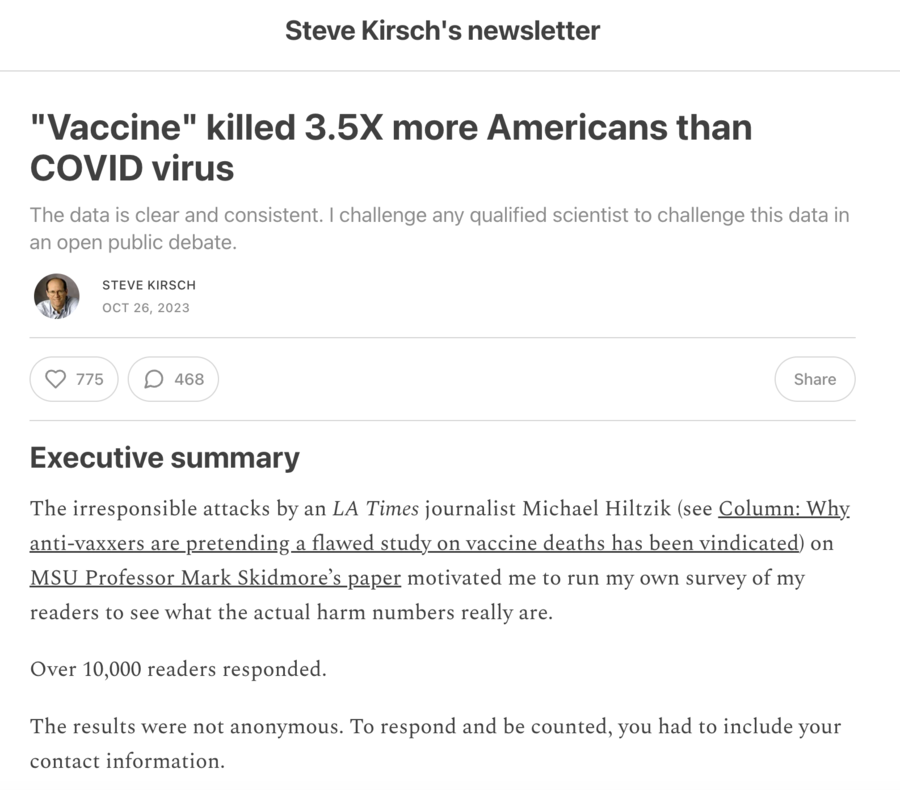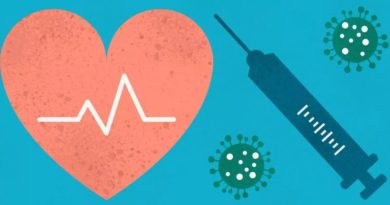Fact Check: ‘Survey’ Does NOT Prove COVID-19 Vaccine Killed 3.5X More Americans Than COVID Virus

Did a “survey” find that COVID-19 vaccines “killed 3.5X more Americans than COVID virus”? No, that’s not true: A medical professional who treats patients of long COVID told Lead Stories that the so-called survey “lacked scientific rigor” and could not be extrapolated to the broader public — it was not scientifically sound and included methodological flaws. The claim originated in a blog post by Steve Kirsch, whose false claims regarding COVID-19 vaccines have been debunked by Lead Stories before. Survey respondents were primarily made up of Kirsch’s already-established audience, meaning they were likely similarly minded people in the first place.
The claim appeared in a newsletter posted by Kirsch to the self-publishing website Substack on October 25, 2023. Titled “‘Vaccine’ killed 3.5X more Americans than COVID virus” (archived here), the article opened:
The irresponsible attacks by an LA Times journalist Michael Hiltzik (see Column: Why anti-vaxxers are pretending a flawed study on vaccine deaths has been vindicated) on MSU Professor Mark Skidmore’s paper motivated me to run my own survey of my readers to see what the actual harm numbers really are.
Over 10,000 readers responded.
The results were not anonymous. To respond and be counted, you had to include your contact information.
This is a huge benefit compared to a “scientific survey.” In a “scientific survey,” you normally aren’t allowed to collect the identity of the responder, so it must be anonymous. So in a “scientific survey,” the peer-reviewers cannot verify whether the research was telling the truth or not. In my survey, they can. Which one is more trustable? After all a key attribute of “scientific evidence” is that is can be independently verified. Mine can. Relatively few published studies (on most topics) cannot be because they never disclose the record level data.
The survey clearly showed that the COVID vaccines have killed 3.5 times as many people as COVID. This is a disaster.
Below is how the post appeared at the time of this publication:
(Source: Substack screenshot captured Mon Oct 30 07:49:28 UTC 2023)
Research that is considered scientifically sound is unbiased and often reviewed by scientific experts in the subject matter or published in a reputable scientific journal where experts can weigh in. In credible research, the data are combed over by experts, and calculations are checked. None of those research elements happened with Kirsch’s DIY survey.
In response to a query from Lead Stories, Dr. Kyle Enfield, a University of Virginia Health pulmonary and critical care medicine specialist who sees patients at UVA Health’s Long COVID Clinic, told Lead Stories Kirsch’s survey “lacked scientific rigor” and any findings could not be extrapolated to broader populations.
In an email received November 2, 2023, Enfield said:
There is no way of establishing causality because of the nature of survey questionnaires in which outcome and exposure are sampled at the same time. In addition, this kind of survey is prone to enriching events because people without an event are unlikely to say anything. Given the nature of the post, the respondents are likely to have a predilection to reporting “events” without supporting evidence. While survey data can be helpful, this kind of study would never make it out of peer review without understanding how the survey was conducted, how the sample was determined, how the data was validated, etc.
Kirsch claimed that his “survey clearly showed that the COVID vaccines have killed 3.5 times as many people as COVID.” This was determined, according to Kirsch, by an analysis of a database of responses to a survey he completed in less than 24 hours. Together, Kirsch argued that this information substantiated a previous survey, which claimed that the vaccines “have killed at least 2.5X more people than COVID” — a claim Lead Stories previously debunked here.
Lead Stories scanned through the 11,168 responses included in the survey, and determined that it is not a randomized, controlled study, indicating that it was not scientifically sound and included methodological flaws. For example, the information provided in the survey was self-reported and not validated for legitimacy or verified for any correlation between reported ailments and immunization.
Below are several examples of survey respondents who admitted that they did not have evidence that the vaccine caused their reported adverse health effects:
- “I listed my husband’s death as vaccine death Even though he was unjabbed I believe he was shed on.”
- “They told us her pancreatic cancer had spread to her liver. This, after almost 5 years in remission. They refused to treat her, saying it wouldn’t change the outcome…”
- “My husband was given blood transfusions and suddenly could not breathe. He died about a week later. He was doing well until the first transfusion…”
- “Sorry, ‘think’ I was injured (neuropathy) but no red pilled doc and no proof.”
Methodological flaws are present in survey response collection and analysis
There are inherent flaws with self-reporting data and Kirsch did not independently vet responses against hospital data or vaccination status. As we have previously reported, research that is considered scientifically sound is often reviewed by scientific experts in the subject matter or published in a reputable scientific journal. In credible research, the data are combed over by experts, and calculations are verified and corroborated.
None of these checks were done as part of Kirsch’s survey.
Kirsch generalized his findings to populations beyond the skewed survey respondents. This does not provide any information about other groups of vaccinated individuals and variables that may impact their infection rate, including age, overall health, and type of vaccine, among other factors.
Additionally, Kirsch did not differentiate between the types of vaccine analyzed nor did he specify whether such a vaccine was an initial dose or subsequent booster. So potential conclusions are not necessarily relevant to all vaccines available on the market.
His request for survey responses was published on October 24, 2023, (archived here) — just a day prior to the article that is the focus of this fact check.
Survey respondents reflect selection bias
The pool of survey respondents also reflects what is known as selection bias, or when the study population is not representative of the target population. In this case, the people who responded to Kirsch’s survey were likely readers of his anti-vaccine blog, skewing the data due to self-selection.
“Selection bias represents a distortion of a measure of association (risk of death) due to sample selection. When you survey a select group of people with fixed beliefs you are at risk of misrepresenting the truth,” Enfield told Lead Stories.
To avoid this bias, a surveyor would need to perform what is known as a cohort study (large samples) with proper follow-up. A survey of 10,000 individuals is likely to show recall bias and cannot establish causality, Enfield added.
For example, below is a small sample of some of the comments pulled from the survey to illustrate how ideologically driven some of the respondents may have been:
- “I Am totally against the vaccination from 2020. I am a molecular biologist who did private works such sciences. We are totally unvaccinated… against it from the start…..the first set of DNA …
- “Hang them. Hang them all. Especially the doctors, nurses, pharmacists and health care government agents.”
- It was just a giant science experiment.”
- I don’t trust ANY vaccines. They are quack science and I have known it for decades.”
- “I don’t believe there is a Covid virus I believe they made the whole thing up but I know a lot of people who take vaccines and none are healthy…”
Survey oversampled people who were unvaccinated against COVID
In addition to a generally biased respondent pool, the survey also oversampled individuals who were unvaccinated. Lead Stories determined this by going into the survey results hosted by Airtable and filtered for “% vaxxed.”
As of November 1, 2023, Lead Stories found that nearly three-quarters of respondents (8,148 people) did not report anyone in their households having been vaccinated. This showed that the survey pool is not a representative sample of the US population and is heavily skewed toward the unvaccinated.
Health officials deem COVID vaccines safe and effective
As of this writing, COVID vaccines are considered safe and effective by U.S. health officials. According to Enfield:
As of June 2023, 1,136,920 people have died from COVID-19, and 668,882,018 doses of the COVID-19 vaccine have been received (WHO data). Assuming the report had a shred of validity, there should be another 3,000,0000 deaths – which we have not seen.
Mandatory reporting by providers of deaths following COVID-19 has proven that the rate of death for individuals getting vaccinated is not higher than the background rate of death. The number of peer-reviewed publications supporting this is numerous and is below this.
As of November 2, 2023, the World Health Organization (WHO) reported 6,977,023 deaths attributed to COVID. As of October 22, 2023, the global health agency reported that a total of 13,533,465,652 vaccine doses had been administered.
“Vaccines save lives, full hard stop,” Enfield told Lead Stories.
Lead Stories articles on claims by Kirsch are here.
Other Lead Stories articles on COVID and vaccines are here and here.
This article has been archived for your research. The original version from Lead Stories can be found here.



